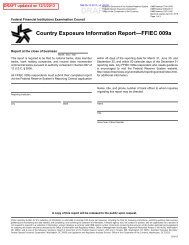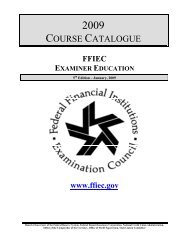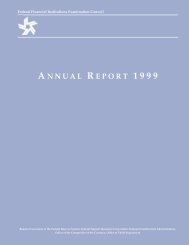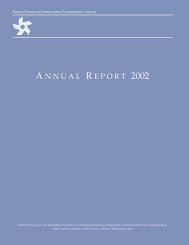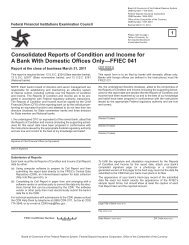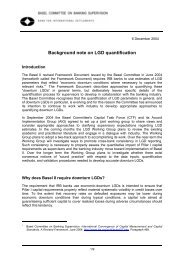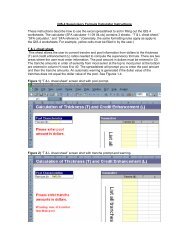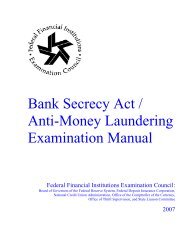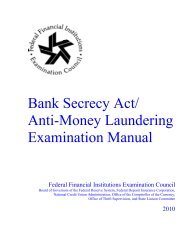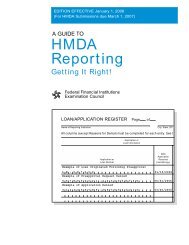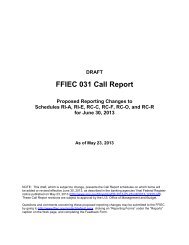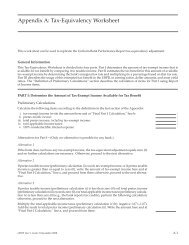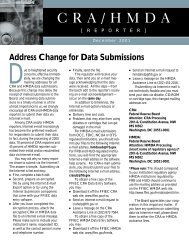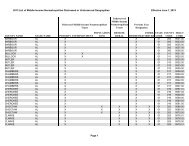Annual Report 2012 - ffiec
Annual Report 2012 - ffiec
Annual Report 2012 - ffiec
Create successful ePaper yourself
Turn your PDF publications into a flip-book with our unique Google optimized e-Paper software.
Office of the Comptroller<br />
of the Currency<br />
The Office of the Comptroller of<br />
the Currency (OCC) is the oldest<br />
federal bank regulatory agency,<br />
established as a bureau of the Treasury<br />
Department by the National<br />
Currency Act of 1863. It is headed<br />
by the Comptroller of the Currency,<br />
who is appointed to a fiveyear<br />
term by the President with the<br />
advice and consent of the Senate.<br />
The Comptroller is also a Director<br />
of the FDIC and a member of<br />
the Financial Stability Oversight<br />
Council.<br />
The OCC was created by Congress<br />
to charter, regulate, and supervise<br />
national banks. On July 21, 2011,<br />
pursuant to the Dodd-Frank Act,<br />
the OCC assumed supervisory<br />
responsibility for federal savings<br />
associations, as well as rulemaking<br />
authority relating to all savings<br />
associations. The OCC regulates<br />
and supervises 1,338 national banks<br />
and trust companies, 573 federal<br />
savings associations, and 47 federal<br />
branches of foreign banks—<br />
accounting for approximately 71<br />
percent of the total assets of all U.S.<br />
commercial banks, federal savings<br />
associations, and branches of<br />
foreign banks. The OCC seeks to<br />
ensure that national banks and federal<br />
savings associations (collectively<br />
“banks”) safely and soundly<br />
manage their risks, comply with<br />
applicable laws, compete effectively<br />
with other providers of financial<br />
services, offer products and<br />
services that meet the needs of customers,<br />
and provide fair access to<br />
financial services and fair treatment<br />
of their customers.<br />
The OCC’s mission-critical programs<br />
include:<br />
• chartering banks and issuing<br />
interpretations related to permissible<br />
banking activities;<br />
• establishing and communicating<br />
regulations, policies, and<br />
operating guidance applicable<br />
to banks; and<br />
• supervising the national system<br />
of banks and savings<br />
associations through on-site<br />
examinations, off-site monitoring,<br />
systemic risk analyses,<br />
and appropriate enforcement<br />
activities.<br />
To meet its objectives, the OCC<br />
maintains a nationwide staff of<br />
bank examiners and other professional<br />
and support personnel.<br />
Headquartered in Washington,<br />
DC, the OCC has four district<br />
offices, which are located in Chicago,<br />
Dallas, Denver, and New<br />
York. In addition, the OCC maintains<br />
a network of 73 field offices<br />
and 20 satellite locations in cities<br />
throughout the United States, as<br />
well as resident examiner teams<br />
in 23 of the largest national banking<br />
companies and an examining<br />
office in London, England.<br />
The Comptroller receives advice<br />
on policy and operational issues<br />
from an Executive Committee<br />
comprised of senior agency officials<br />
who lead major business<br />
units.<br />
The OCC is funded primarily by<br />
semiannual assessments on banks,<br />
interest revenue from its investment<br />
in U.S. Treasury securities,<br />
and other fees. The OCC does not<br />
receive congressional appropriations<br />
for any of its operations.<br />
29



